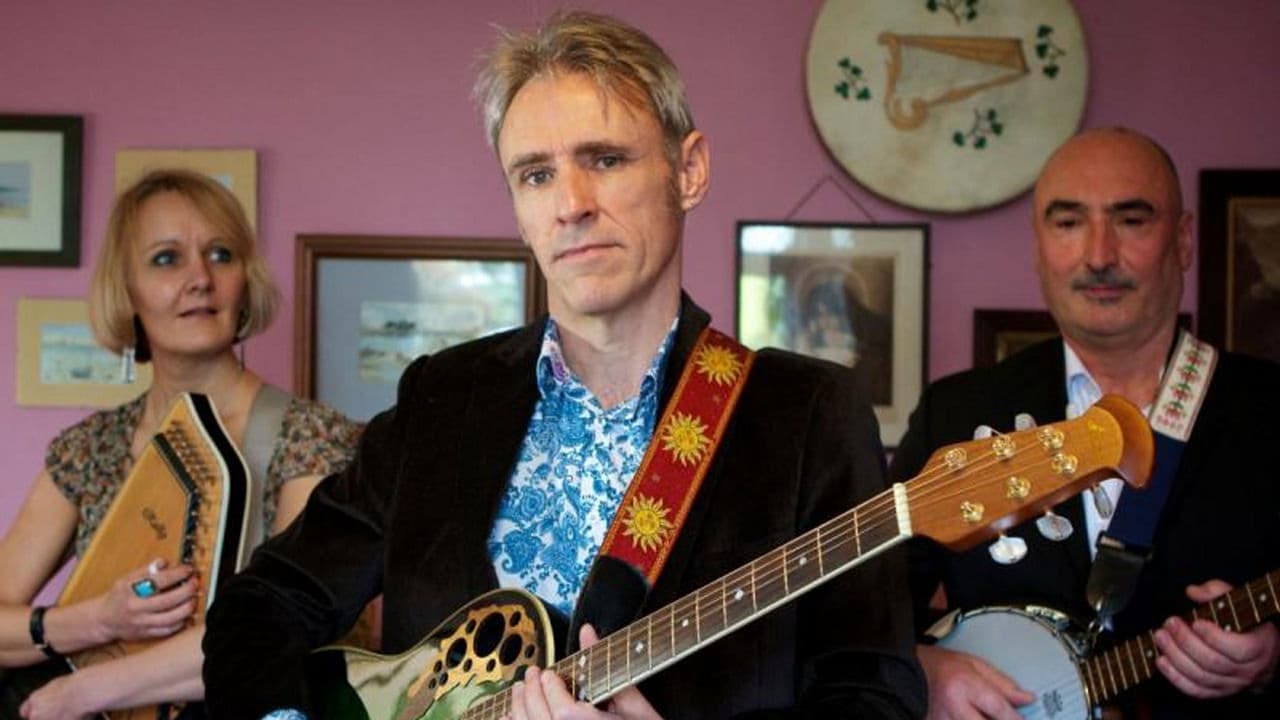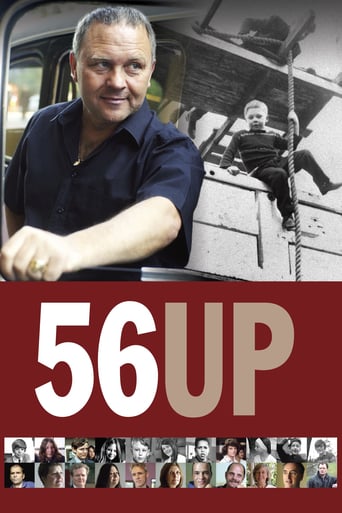

The "Up" documentary series comprises what is surely the most impressive longitudinal study ever committed to film. It is an obvious labor of love for director Michael Apted, who has remained faithful to the project - and to its participants - for close to fifty years now. It all began in 1964, when producers at Britain's Granada Television gathered together a group of seven-year-olds from all walks of life and interviewed them for a TV documentary entitled "7Up," focused on the hopes and aspirations of these youngsters as they embarked on a long but uncertain journey into the future. Every seven years since, like clockwork, Apted has gone back to these individuals to take a peek into their lives, examining the paths they've taken and juxtaposing those youthful aspirations expressed in the original film with the realities of their lives as they've played themselves out. (The stunning contrast between the grainy black-and-white imagery of the first film and the hi- def clarity of the current interviews underlines the extraordinary length of time the series has already covered).In "56Up," the eighth installment in the series, its subjects are leaving the confidence and security and general good health of middle age and just beginning to confront the realities of impending old age and contemplating an array of end-of-life issues (if not for themselves yet, at least for their parents). And it is for this reason that "56Up" is one of the most poignant and insightful entries in the series (and one imagines it will only get more poignant and insightful with each successive edition). All the major issues of marriage/divorce, career and parenthood seem to have long ago been settled for most of them, as they now concentrate on their roles as grandparents and life guides for their own adult children as they embark on their own lives and families. There's less naïve hope expressed in this film and more of an acceptance of how life has turned out for the participants, though there is a marked lack of cynicism and pessimism in the way they speak about their lives. Of course, they're still young enough at this point to be physically active and fully engaged in their careers and their communities, but there's no denying that the prospect of that fast- approaching downward slope of life is weighing, at least to some degree, on these people's minds. Yet, even those who haven't yet achieved their "ideal" lives still haven't given up hope that they will one day find what it is they're looking for. For obvious reasons, it is this installment that most comprehensively captures the range of a lifetime, at least until "63Up," "70Up," etc., arrive on the scene in the lead-up to the foreordained conclusion of the series.It's clear from watching this jumble of clips from eight distinct periods of time that each stage of life contains a set of joys and concerns unique unto itself, a universal truth that this series, by its very nature, seems singularly equipped to illustrate. It's a bit like thumbing through - an admittedly disorganized - family photo album, but with insightful commentary from the individuals involved inserted along the way.One, perhaps unforeseen, thread that runs through this film involves the self-reflection on the part of some of the participants about their appearance in the series - the sometimes unwelcome notoriety it has brought to them and their lives, with at least one of them pulling out of the project for a time only to reconnect with it at this stage, after having come to terms with himself and grown confident in his own skin. A few even question the very value of the series itself, feeling that these brief glimpses into their lives every seven years fail to create anything close to a true portrait of their lives and of themselves as people - a concern that Apted deserves much credit for including in his final product. After all, these people, at seven years of age, did not exactly ask to become a part of this much-viewed series, and why SHOULD they want to be defined and represented by it? On the other hand, as one of the participants points out, the series really isn't about these particular individuals as much as it is about how, collectively, they serve as a sort of mirror in which the rest of us can see our own lives reflected.Yet, something indefinable and intangible keeps many of them coming back every seven years to open up and share at least a small part of their lives with us. And for that the world shall be eternally grateful. Now onto the next installment.
... View MoreWhile I did check the Spoiler box, I wanted to warn again that I might have some spoilers in this review.Perhaps not surprisingly, this series has been uneven. Some very good ones, and some not-so-good ones. I'd say with the exception of the original 7 Up, this is probably the best in the series. I am five years younger than these people, so I could relate to some of the their feelings at this stage in their life. I thought that as they are aging, most of them have become more and more likable. Even cab driver Tony, one of my least favorite people in this series now comes off as a decent guy to me. Obviously, Neil is probably the most compelling character of this group, and I'm glad to see that he's doing so much better now compared to 28 and 35.I also thought that it was smart that when Apted shows clips from prior cycles, he is starting to put on the screen which movie it came from. At 42 Up and 49 Up, it was getting extremely difficult to figure out which years we were seeing in the massive cross-cutting that is done. This makes 56 Up much easier to follow than those two.On the DVD's Special Features, section, I would also highly recommend watching the late Roger Ebert's interview with Michael Apted after 49 Up came out. It definitely gave me additional insight and context. Next to Neil, I have always found Suzy to be my favorite person in the series, primarily because of her extreme transformation from 21 to 28! Apted notes in the commentary that Suzy is a big fan favorite for many...I thought it might have only been me! He also notes how the tone is different for each of these films, based on what is going on at that life stage, and actually refers to 28 Up as "overbearing." I found that interesting, because for me, 28 Up is by far the worst of the series.If you haven't seen any of the series, I'm not sure I'd recommend this. One should at least see 7 Up/14 Up (on the same DVD in America) before seeing 56 Up. I started with 49 Up when it came out, and since then, started watching them in order so that I would be all caught up with 56 Up.
... View More56 Up - hard to believe. I've watched 3 or 4 of these over my 53 years, and each one becomes harder for me to watch as I get older. I was suddenly a little scared when the titles for this one started; I almost walked out of the theater. What has become of this group of kids that director Apted has been following since he was 22 years old? What new tragedies had befallen them? Whatever became of the homeless guy? Would any of them finally blow up at Apted on-camera?Probably the most unnerving thing for me was that the film would just be unbearably poignant. It seems almost god-like to be able to see how a group of 14 people's lives have progressed over a 49-year period. (Yet, as one of the men complains, viewers can't possibly know these people, even though many in Britain presume to (since this was shown on TV there, many British people have watched all 8 films). Fortunately, however, the film isn't overly sentimental or maudlin. Still, the film is very touching and can't help but make you think about your own life and trials, what advantages you may or may not have had compared to these people, and how you would have fared given their circumstances.One of the sadder aspects of these films is to see how life seems to have "beaten down" so many of these people. Some of the kids with bright, shiny eyes who seemed to have so much energy and hope now seem to be dejected and defeated adults. Yet this isn't true for all of them - some of the reserved, quiet kids turned out to be reserved, quiet adults. And it's not all sad - there are some good laughs and some inspiring successes. And two subjects who had dropped out returned for this segment - one to promote his band! There are plenty of clips from earlier segments, so you don't need to rent any of the earlier ones, but I'd recommend it. You get a more profound sense of the flow of their lives by seeing at least one other one. But whatever you do, see this one.
... View MoreMichael Apted has had a long and successful career as a director. His credits have included such upper-middle-brow works as GORILLAS IN THE MIST and ENIGMA, and such popular works as a Bond movie and COAL MINER'S DAUGHTER. His most fascinating work has been on 1963's 7 UP, for which he was a researcher, and its sequels. Every seven years since the original show, Apted has interviewed and directed the same collection of ordinary Britons from all backgrounds.Partly a survey of contemporary British life, partly a work of sociology, but mostly an album of snapshots, they offer the viewer a fascinating look at how lives diverge and snake around each other: an upper class boy whose life has followed the expectations he had at seven. A farm boy who became a nuclear physicist; girls who grew up to be mothers and grandmothers and are now dealing with death. I have been following this since they were twenty-one, and have looked at all of them on DVD. Everyone has a story, unique and commonplace at the same time, some happy, some sad, some mixed.The eighth in the series has finally made its appearance in the US on the movie screen, and I don't know how to describe it to you. All I know is that it is utterly fascinating, both as a portrait of British society and of individuals trying to cope with sporadic celebrity. I don't know how much longer Mr. Apted will be able to continue to do these shows -- he is 72 himself -- but I will continue to look at them as long as he and his collection of subjects continue to make them and I urge you to take a look.
... View More